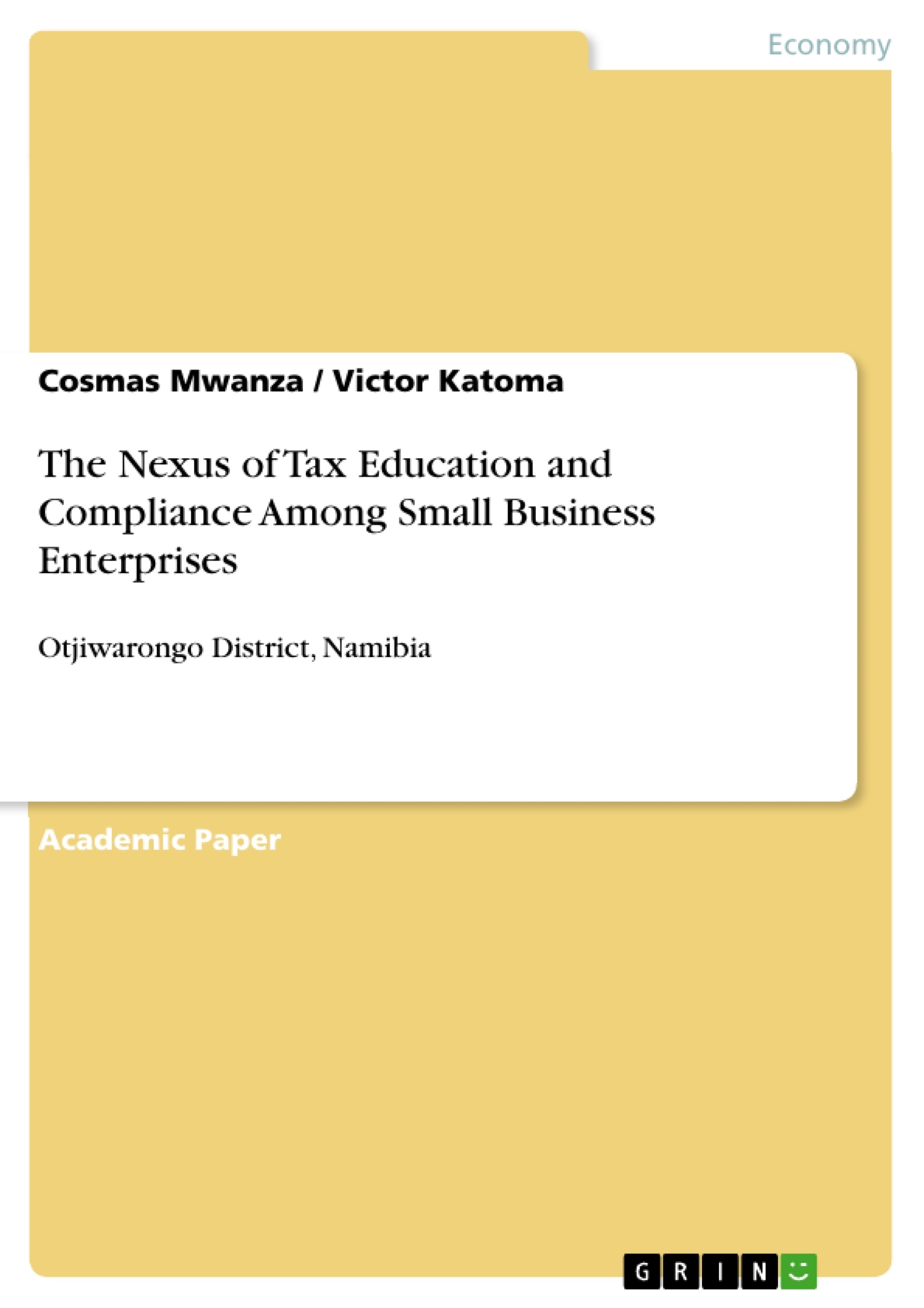The study set out to investigate the influence of tax education on tax compliance. It unearthed a lacuna between tax education and tax compliance which indicated an interplay between the theories of economic deterrent, reasoned action and the theory of planned behavior. Tax non-compliance was attributed to unfairness, dishonesty by colleagues submitting incorrect tax returns, and the complexity of the tax system and tax forms.
The issue of tax compliance from SMEs in developing countries has remained a blighting problem for a long time. Despite tax education being diagnosed as the panacea for improving tax compliance from small business owners, the situation has not changed. A divide regarding the issue of tax education as influencing the collection of tax from SMEs still exists among researchers.
Some scholars indicate a positive effect of tax education on compliance and others view tax education as a recipe for propagating tax evasion. However, for developmental projects to improve the lives of the citizenry, educating tax-payers aims to improve revenue collection from this category of business people. This study employed an exploratory concurrent mixed research approach on 98 SMEs operating within the Ojtiwarongo district.
Inhaltsverzeichnis (Table of Contents)
- ABSTRACT
- 1. INTRODUCTION
- 1.1 Research questions
- 2. LITERATURE REVIEW
- 2.1 Small and Medium Enterprises (SME's)
- 2.2 Genesis of Tax Compliance Research
- 2.3 Theories of Tax Compliance
- 2.3.1 Theory of Planned Behaviour (TPB)
- 2.3.2 Economic Deterrence Theory (EDT)
- 2.3.3 Theory of Reasoned Action (TRA)
- 2.4 The Fischer Model
- 2.4.1 Fisher Model and Major Influences of Tax Compliance
- 2.5 Categories of Tax Compliance
- 2.6 Attitudes, Tax Education and Compliance
- 2.7 Perceptions and individual taxpayer education and compliance
- 2.8 Tax knowledge, tax education and compliance
- 3. RESEARCH METHODOLOGY
- 3.1 Population
- 3.2 Pilot study
- 3.3 Sampling and sampling procedures
- 3.4 Validity and reliability
- 3.5 Ethical considerations
- 4. DATA ANALYSIS
- 4.1 Demographics
- 4.2 Objective One
- 4.3 Objective Two
- 4.4 Interview questions and responses
- 4.4.1. Do you feel that you paying a fair tax?
- 4.4.2 Do you believe the current tax system is complex to understand?
- 4.4.3 Do you think by not paying tax there is a probability of detection and penalties?
- 4.4.4 Do you think by not paying tax there is a probability of detection and penalties?
- 5. Observations from primary data
- 5.1 Quantitative study results
- 5.2 Interview opinions of SMEs on tax
- REFERENCES
Zielsetzung und Themenschwerpunkte (Objectives and Key Themes)
This study explores the influence of tax education on tax compliance among Small and Medium Enterprises (SMEs) in the Otjiwarongo district of Namibia. The research aims to understand the relationship between tax education and compliance, specifically by examining the levels of tax knowledge among SMEs and their attitudes towards tax compliance. Additionally, the study aims to provide recommendations for improving tax compliance among SMEs in the region.
- The impact of tax education on tax compliance among SMEs.
- Factors influencing tax compliance among SMEs, including attitudes, perceptions, and knowledge.
- The role of the Fischer model in understanding tax compliance behavior.
- The application of various theories of tax compliance, such as the Theory of Planned Behaviour, Economic Deterrence Theory, and the Theory of Reasoned Action.
- Recommendations for enhancing tax compliance among SMEs in the Otjiwarongo district.
Zusammenfassung der Kapitel (Chapter Summaries)
The introduction delves into the prevalent issue of tax evasion and its impact on development in developing countries. The study highlights the importance of tax education as a strategy for improving tax compliance and service delivery. Chapter 2 provides a comprehensive literature review, exploring the concept of SMEs, the genesis of tax compliance research, and various theories of tax compliance, including the Theory of Planned Behaviour, Economic Deterrence Theory, and the Theory of Reasoned Action. The chapter also examines the Fischer model and its relevance to understanding tax compliance behavior.
Chapter 3 outlines the research methodology employed in the study, including the population, sampling procedures, validity and reliability, and ethical considerations. Chapter 4 focuses on the data analysis, examining demographics, interview questions and responses, and observations from primary data, including quantitative study results and interview opinions of SMEs on tax.
Schlüsselwörter (Keywords)
The study focuses on the nexus of tax education and compliance among Small and Medium Enterprises (SMEs), employing the Fischer model to analyze the relationship. Key concepts explored include tax compliance, tax education, economic deterrence, reasoned action, planned behavior, attitudes, perceptions, and tax knowledge.
- Quote paper
- Cosmas Mwanza (Author), Victor Katoma (Author), 2019, The Nexus of Tax Education and Compliance Among Small Business Enterprises, Munich, GRIN Verlag, https://www.grin.com/document/509819



